EEP305 - Importance of Theories in Early Childhood Education Essay
VerifiedAdded on 2023/06/10
|9
|2423
|103
Essay
AI Summary
This essay explores the significance of early childhood educators drawing upon various theoretical perspectives in their work, particularly within the framework of the Early Years Learning Framework (EYLF). It critically analyzes key concepts and theories related to early childhood education, examining both strengths and weaknesses. The essay discusses different types of theories, including socio-cultural, critical, developmental, socio-behaviorist, and post-structuralist theories, and reflects on their implications for curriculum practices. It concludes that while theories overlap and educators hold diverse perspectives, a comprehensive understanding of these theories is crucial for effective early childhood education. Desklib provides access to this essay and other study resources for students.
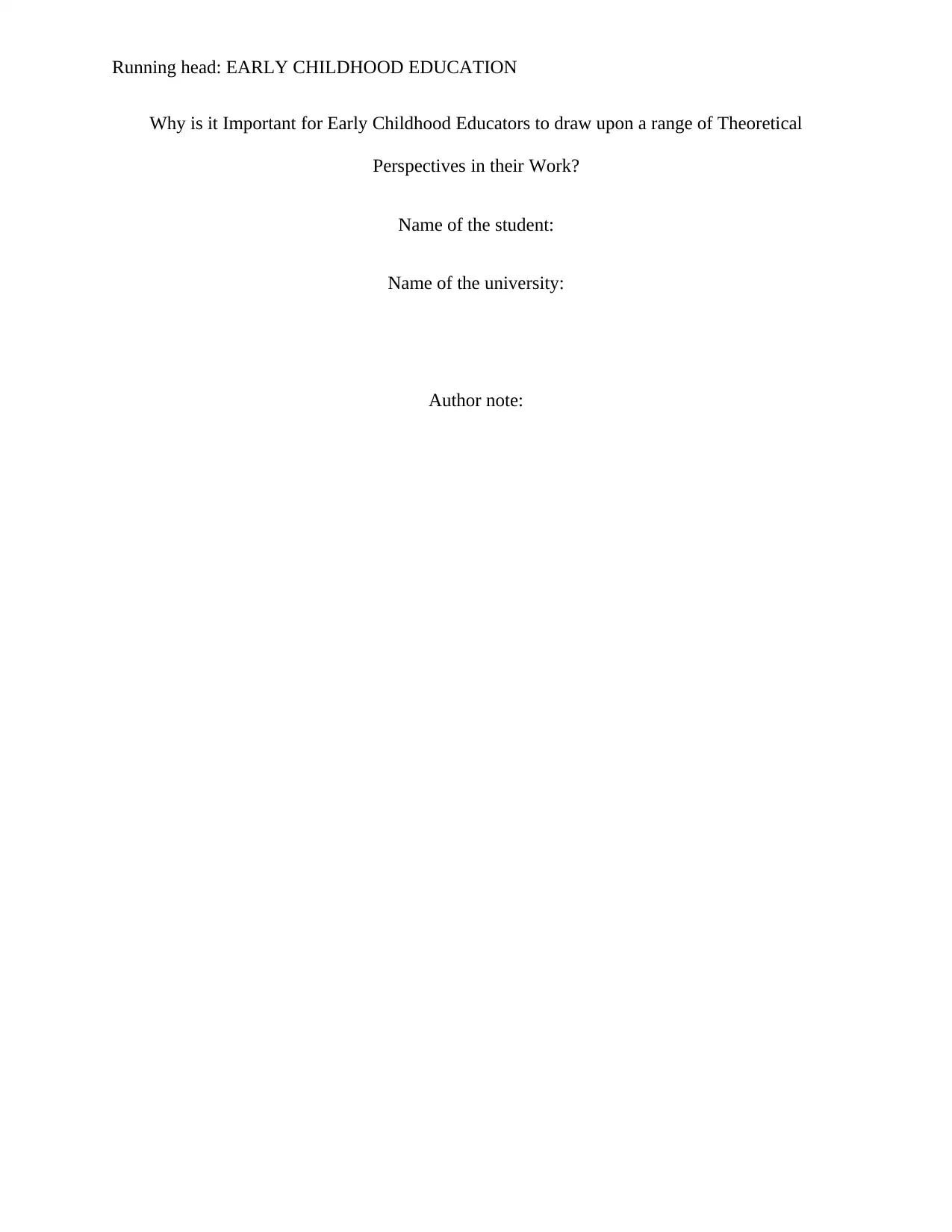
Running head: EARLY CHILDHOOD EDUCATION
Why is it Important for Early Childhood Educators to draw upon a range of Theoretical
Perspectives in their Work?
Name of the student:
Name of the university:
Author note:
Why is it Important for Early Childhood Educators to draw upon a range of Theoretical
Perspectives in their Work?
Name of the student:
Name of the university:
Author note:
Paraphrase This Document
Need a fresh take? Get an instant paraphrase of this document with our AI Paraphraser
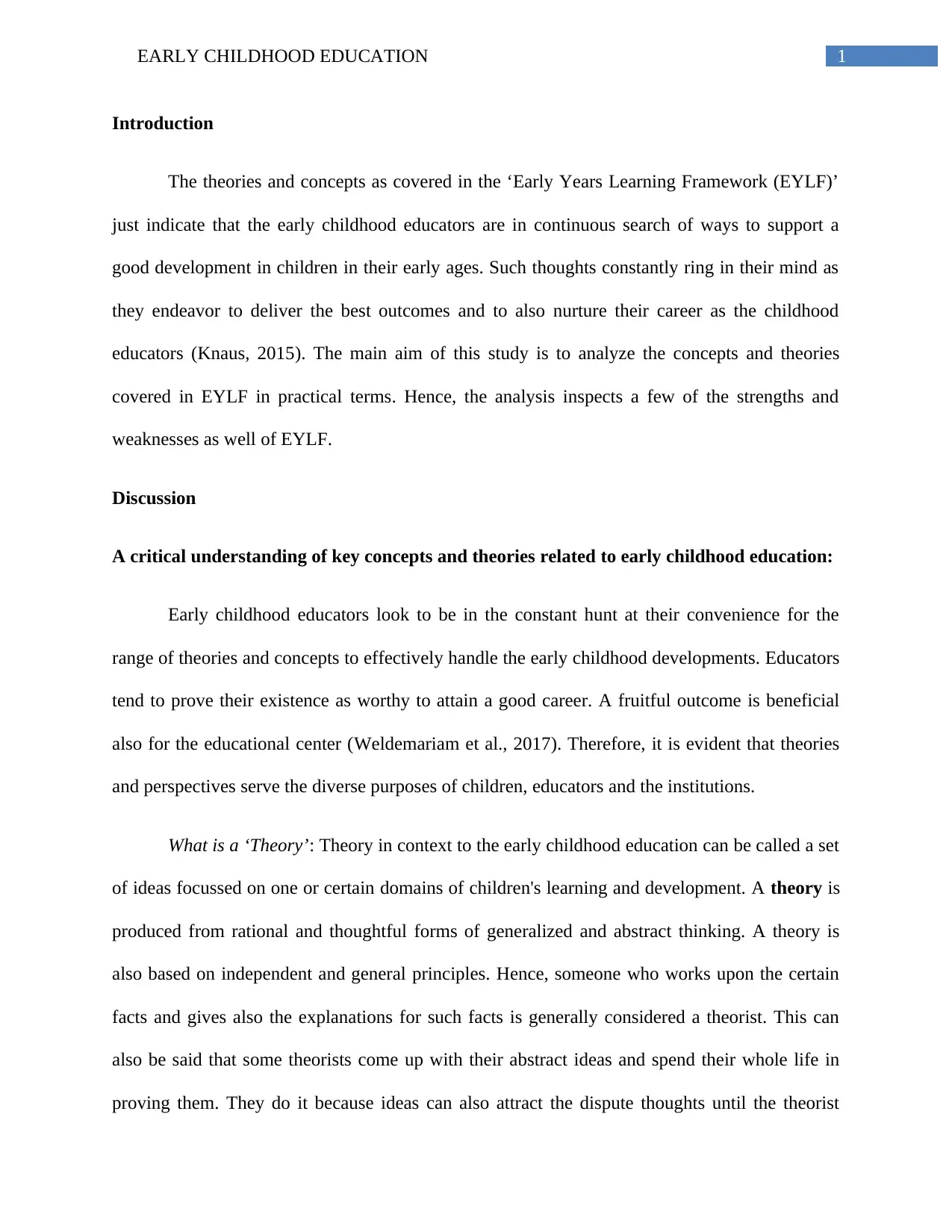
1EARLY CHILDHOOD EDUCATION
Introduction
The theories and concepts as covered in the ‘Early Years Learning Framework (EYLF)’
just indicate that the early childhood educators are in continuous search of ways to support a
good development in children in their early ages. Such thoughts constantly ring in their mind as
they endeavor to deliver the best outcomes and to also nurture their career as the childhood
educators (Knaus, 2015). The main aim of this study is to analyze the concepts and theories
covered in EYLF in practical terms. Hence, the analysis inspects a few of the strengths and
weaknesses as well of EYLF.
Discussion
A critical understanding of key concepts and theories related to early childhood education:
Early childhood educators look to be in the constant hunt at their convenience for the
range of theories and concepts to effectively handle the early childhood developments. Educators
tend to prove their existence as worthy to attain a good career. A fruitful outcome is beneficial
also for the educational center (Weldemariam et al., 2017). Therefore, it is evident that theories
and perspectives serve the diverse purposes of children, educators and the institutions.
What is a ‘Theory’: Theory in context to the early childhood education can be called a set
of ideas focussed on one or certain domains of children's learning and development. A theory is
produced from rational and thoughtful forms of generalized and abstract thinking. A theory is
also based on independent and general principles. Hence, someone who works upon the certain
facts and gives also the explanations for such facts is generally considered a theorist. This can
also be said that some theorists come up with their abstract ideas and spend their whole life in
proving them. They do it because ideas can also attract the dispute thoughts until the theorist
Introduction
The theories and concepts as covered in the ‘Early Years Learning Framework (EYLF)’
just indicate that the early childhood educators are in continuous search of ways to support a
good development in children in their early ages. Such thoughts constantly ring in their mind as
they endeavor to deliver the best outcomes and to also nurture their career as the childhood
educators (Knaus, 2015). The main aim of this study is to analyze the concepts and theories
covered in EYLF in practical terms. Hence, the analysis inspects a few of the strengths and
weaknesses as well of EYLF.
Discussion
A critical understanding of key concepts and theories related to early childhood education:
Early childhood educators look to be in the constant hunt at their convenience for the
range of theories and concepts to effectively handle the early childhood developments. Educators
tend to prove their existence as worthy to attain a good career. A fruitful outcome is beneficial
also for the educational center (Weldemariam et al., 2017). Therefore, it is evident that theories
and perspectives serve the diverse purposes of children, educators and the institutions.
What is a ‘Theory’: Theory in context to the early childhood education can be called a set
of ideas focussed on one or certain domains of children's learning and development. A theory is
produced from rational and thoughtful forms of generalized and abstract thinking. A theory is
also based on independent and general principles. Hence, someone who works upon the certain
facts and gives also the explanations for such facts is generally considered a theorist. This can
also be said that some theorists come up with their abstract ideas and spend their whole life in
proving them. They do it because ideas can also attract the dispute thoughts until the theorist
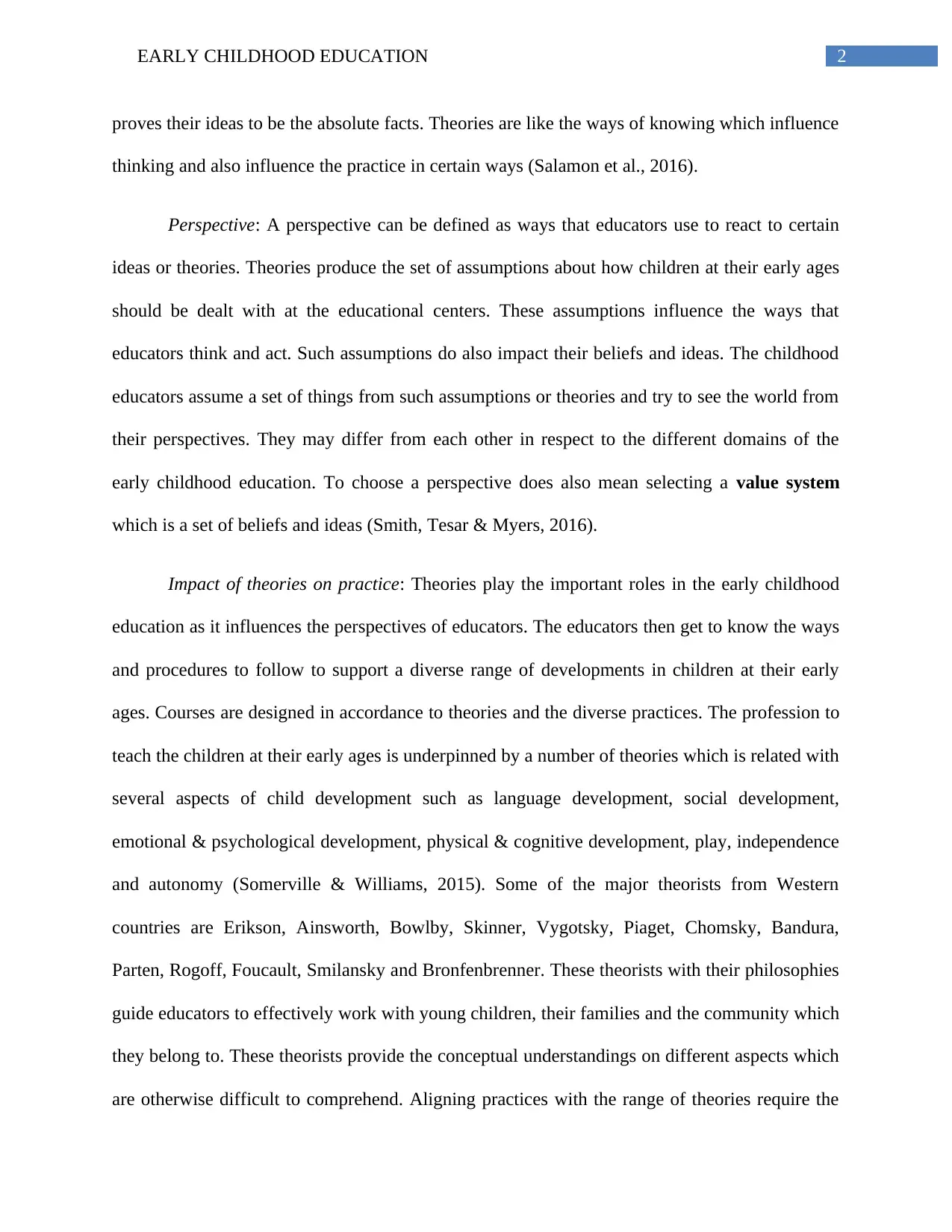
2EARLY CHILDHOOD EDUCATION
proves their ideas to be the absolute facts. Theories are like the ways of knowing which influence
thinking and also influence the practice in certain ways (Salamon et al., 2016).
Perspective: A perspective can be defined as ways that educators use to react to certain
ideas or theories. Theories produce the set of assumptions about how children at their early ages
should be dealt with at the educational centers. These assumptions influence the ways that
educators think and act. Such assumptions do also impact their beliefs and ideas. The childhood
educators assume a set of things from such assumptions or theories and try to see the world from
their perspectives. They may differ from each other in respect to the different domains of the
early childhood education. To choose a perspective does also mean selecting a value system
which is a set of beliefs and ideas (Smith, Tesar & Myers, 2016).
Impact of theories on practice: Theories play the important roles in the early childhood
education as it influences the perspectives of educators. The educators then get to know the ways
and procedures to follow to support a diverse range of developments in children at their early
ages. Courses are designed in accordance to theories and the diverse practices. The profession to
teach the children at their early ages is underpinned by a number of theories which is related with
several aspects of child development such as language development, social development,
emotional & psychological development, physical & cognitive development, play, independence
and autonomy (Somerville & Williams, 2015). Some of the major theorists from Western
countries are Erikson, Ainsworth, Bowlby, Skinner, Vygotsky, Piaget, Chomsky, Bandura,
Parten, Rogoff, Foucault, Smilansky and Bronfenbrenner. These theorists with their philosophies
guide educators to effectively work with young children, their families and the community which
they belong to. These theorists provide the conceptual understandings on different aspects which
are otherwise difficult to comprehend. Aligning practices with the range of theories require the
proves their ideas to be the absolute facts. Theories are like the ways of knowing which influence
thinking and also influence the practice in certain ways (Salamon et al., 2016).
Perspective: A perspective can be defined as ways that educators use to react to certain
ideas or theories. Theories produce the set of assumptions about how children at their early ages
should be dealt with at the educational centers. These assumptions influence the ways that
educators think and act. Such assumptions do also impact their beliefs and ideas. The childhood
educators assume a set of things from such assumptions or theories and try to see the world from
their perspectives. They may differ from each other in respect to the different domains of the
early childhood education. To choose a perspective does also mean selecting a value system
which is a set of beliefs and ideas (Smith, Tesar & Myers, 2016).
Impact of theories on practice: Theories play the important roles in the early childhood
education as it influences the perspectives of educators. The educators then get to know the ways
and procedures to follow to support a diverse range of developments in children at their early
ages. Courses are designed in accordance to theories and the diverse practices. The profession to
teach the children at their early ages is underpinned by a number of theories which is related with
several aspects of child development such as language development, social development,
emotional & psychological development, physical & cognitive development, play, independence
and autonomy (Somerville & Williams, 2015). Some of the major theorists from Western
countries are Erikson, Ainsworth, Bowlby, Skinner, Vygotsky, Piaget, Chomsky, Bandura,
Parten, Rogoff, Foucault, Smilansky and Bronfenbrenner. These theorists with their philosophies
guide educators to effectively work with young children, their families and the community which
they belong to. These theorists provide the conceptual understandings on different aspects which
are otherwise difficult to comprehend. Aligning practices with the range of theories require the
⊘ This is a preview!⊘
Do you want full access?
Subscribe today to unlock all pages.

Trusted by 1+ million students worldwide
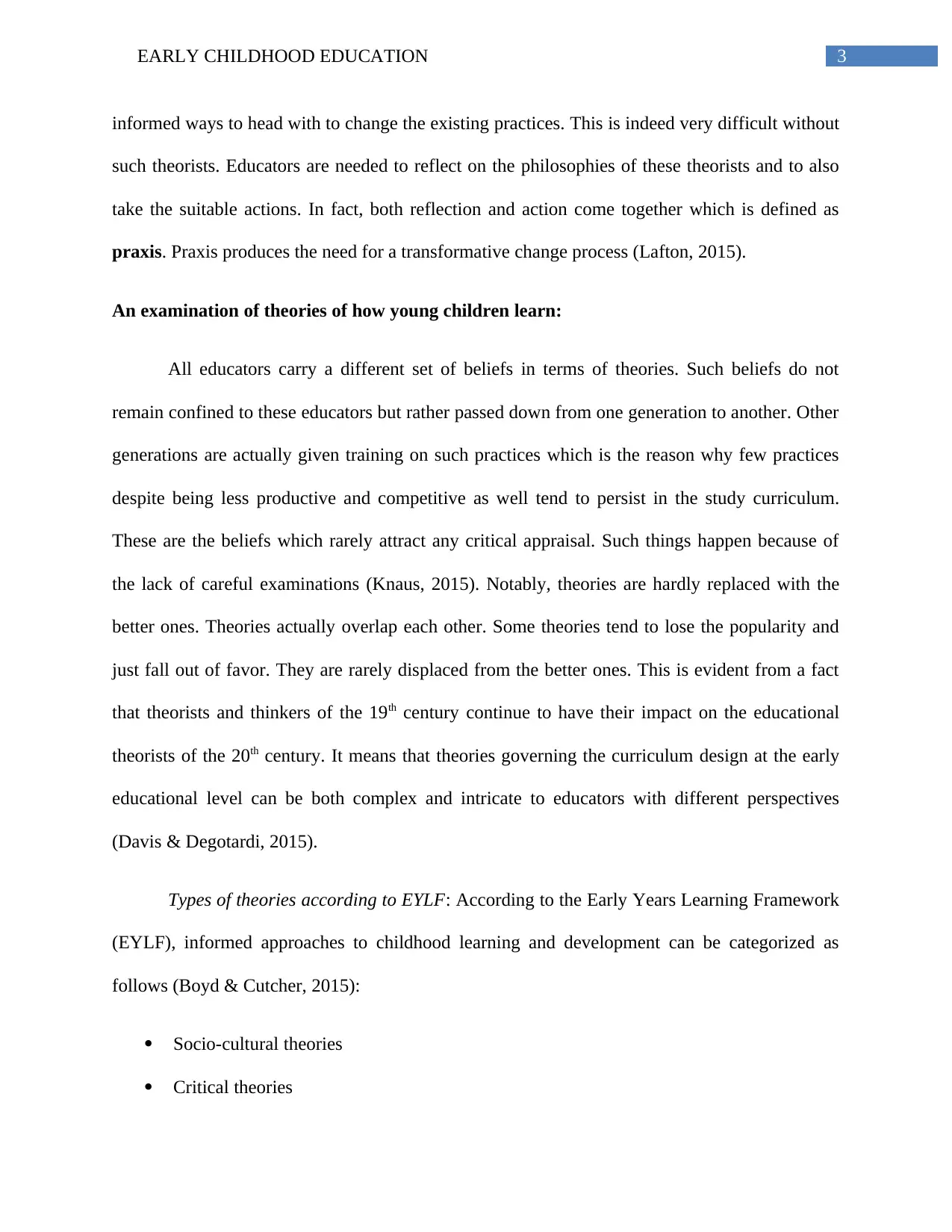
3EARLY CHILDHOOD EDUCATION
informed ways to head with to change the existing practices. This is indeed very difficult without
such theorists. Educators are needed to reflect on the philosophies of these theorists and to also
take the suitable actions. In fact, both reflection and action come together which is defined as
praxis. Praxis produces the need for a transformative change process (Lafton, 2015).
An examination of theories of how young children learn:
All educators carry a different set of beliefs in terms of theories. Such beliefs do not
remain confined to these educators but rather passed down from one generation to another. Other
generations are actually given training on such practices which is the reason why few practices
despite being less productive and competitive as well tend to persist in the study curriculum.
These are the beliefs which rarely attract any critical appraisal. Such things happen because of
the lack of careful examinations (Knaus, 2015). Notably, theories are hardly replaced with the
better ones. Theories actually overlap each other. Some theories tend to lose the popularity and
just fall out of favor. They are rarely displaced from the better ones. This is evident from a fact
that theorists and thinkers of the 19th century continue to have their impact on the educational
theorists of the 20th century. It means that theories governing the curriculum design at the early
educational level can be both complex and intricate to educators with different perspectives
(Davis & Degotardi, 2015).
Types of theories according to EYLF: According to the Early Years Learning Framework
(EYLF), informed approaches to childhood learning and development can be categorized as
follows (Boyd & Cutcher, 2015):
Socio-cultural theories
Critical theories
informed ways to head with to change the existing practices. This is indeed very difficult without
such theorists. Educators are needed to reflect on the philosophies of these theorists and to also
take the suitable actions. In fact, both reflection and action come together which is defined as
praxis. Praxis produces the need for a transformative change process (Lafton, 2015).
An examination of theories of how young children learn:
All educators carry a different set of beliefs in terms of theories. Such beliefs do not
remain confined to these educators but rather passed down from one generation to another. Other
generations are actually given training on such practices which is the reason why few practices
despite being less productive and competitive as well tend to persist in the study curriculum.
These are the beliefs which rarely attract any critical appraisal. Such things happen because of
the lack of careful examinations (Knaus, 2015). Notably, theories are hardly replaced with the
better ones. Theories actually overlap each other. Some theories tend to lose the popularity and
just fall out of favor. They are rarely displaced from the better ones. This is evident from a fact
that theorists and thinkers of the 19th century continue to have their impact on the educational
theorists of the 20th century. It means that theories governing the curriculum design at the early
educational level can be both complex and intricate to educators with different perspectives
(Davis & Degotardi, 2015).
Types of theories according to EYLF: According to the Early Years Learning Framework
(EYLF), informed approaches to childhood learning and development can be categorized as
follows (Boyd & Cutcher, 2015):
Socio-cultural theories
Critical theories
Paraphrase This Document
Need a fresh take? Get an instant paraphrase of this document with our AI Paraphraser
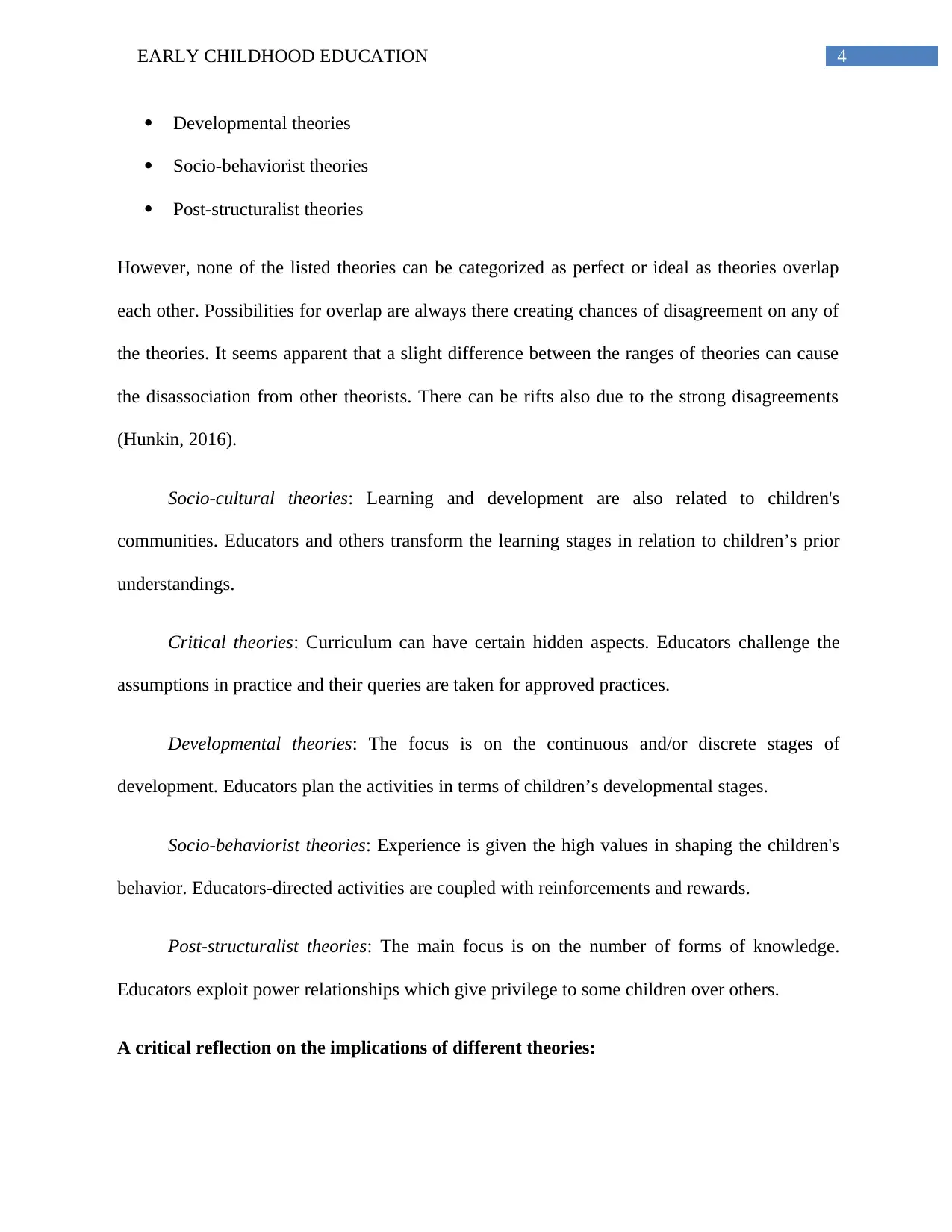
4EARLY CHILDHOOD EDUCATION
Developmental theories
Socio-behaviorist theories
Post-structuralist theories
However, none of the listed theories can be categorized as perfect or ideal as theories overlap
each other. Possibilities for overlap are always there creating chances of disagreement on any of
the theories. It seems apparent that a slight difference between the ranges of theories can cause
the disassociation from other theorists. There can be rifts also due to the strong disagreements
(Hunkin, 2016).
Socio-cultural theories: Learning and development are also related to children's
communities. Educators and others transform the learning stages in relation to children’s prior
understandings.
Critical theories: Curriculum can have certain hidden aspects. Educators challenge the
assumptions in practice and their queries are taken for approved practices.
Developmental theories: The focus is on the continuous and/or discrete stages of
development. Educators plan the activities in terms of children’s developmental stages.
Socio-behaviorist theories: Experience is given the high values in shaping the children's
behavior. Educators-directed activities are coupled with reinforcements and rewards.
Post-structuralist theories: The main focus is on the number of forms of knowledge.
Educators exploit power relationships which give privilege to some children over others.
A critical reflection on the implications of different theories:
Developmental theories
Socio-behaviorist theories
Post-structuralist theories
However, none of the listed theories can be categorized as perfect or ideal as theories overlap
each other. Possibilities for overlap are always there creating chances of disagreement on any of
the theories. It seems apparent that a slight difference between the ranges of theories can cause
the disassociation from other theorists. There can be rifts also due to the strong disagreements
(Hunkin, 2016).
Socio-cultural theories: Learning and development are also related to children's
communities. Educators and others transform the learning stages in relation to children’s prior
understandings.
Critical theories: Curriculum can have certain hidden aspects. Educators challenge the
assumptions in practice and their queries are taken for approved practices.
Developmental theories: The focus is on the continuous and/or discrete stages of
development. Educators plan the activities in terms of children’s developmental stages.
Socio-behaviorist theories: Experience is given the high values in shaping the children's
behavior. Educators-directed activities are coupled with reinforcements and rewards.
Post-structuralist theories: The main focus is on the number of forms of knowledge.
Educators exploit power relationships which give privilege to some children over others.
A critical reflection on the implications of different theories:
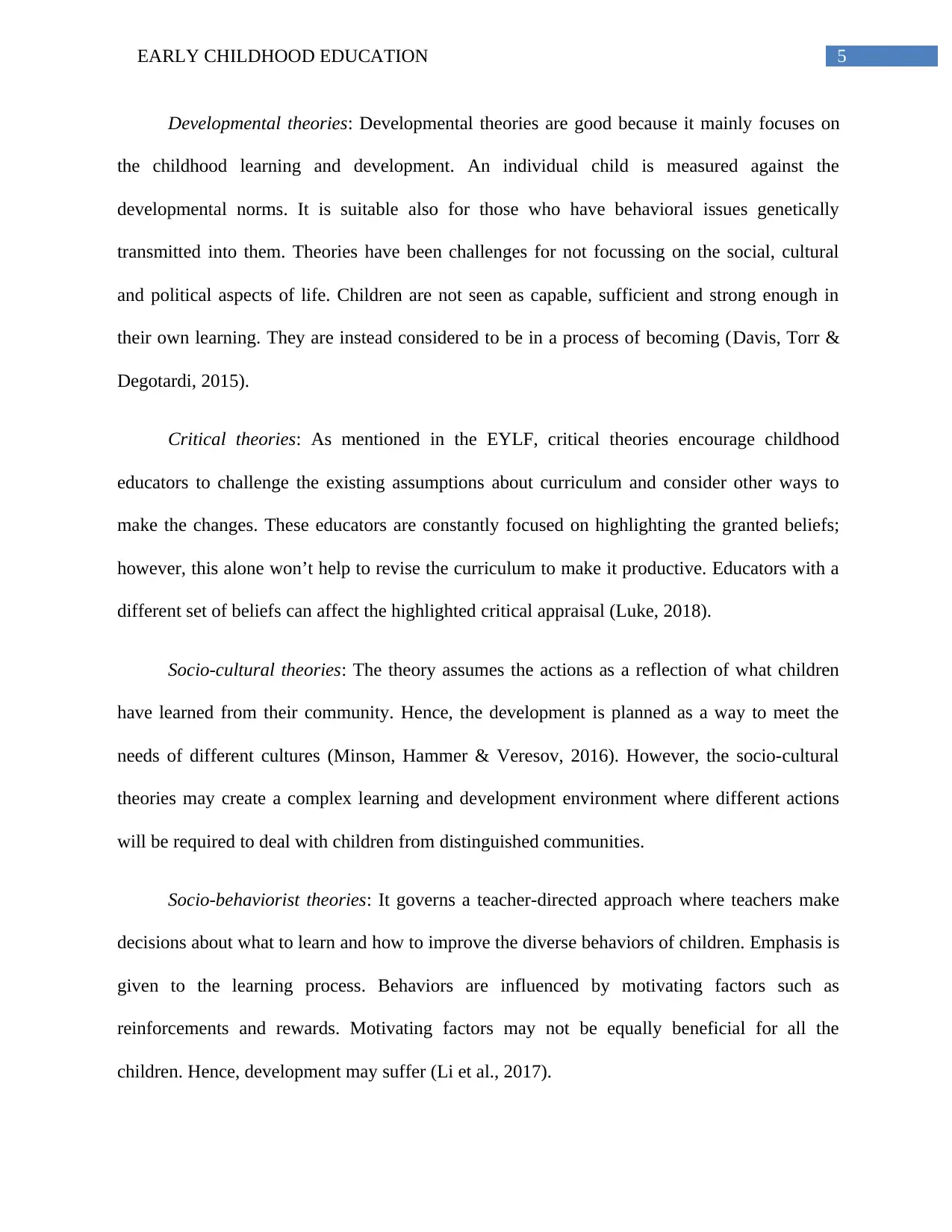
5EARLY CHILDHOOD EDUCATION
Developmental theories: Developmental theories are good because it mainly focuses on
the childhood learning and development. An individual child is measured against the
developmental norms. It is suitable also for those who have behavioral issues genetically
transmitted into them. Theories have been challenges for not focussing on the social, cultural
and political aspects of life. Children are not seen as capable, sufficient and strong enough in
their own learning. They are instead considered to be in a process of becoming (Davis, Torr &
Degotardi, 2015).
Critical theories: As mentioned in the EYLF, critical theories encourage childhood
educators to challenge the existing assumptions about curriculum and consider other ways to
make the changes. These educators are constantly focused on highlighting the granted beliefs;
however, this alone won’t help to revise the curriculum to make it productive. Educators with a
different set of beliefs can affect the highlighted critical appraisal (Luke, 2018).
Socio-cultural theories: The theory assumes the actions as a reflection of what children
have learned from their community. Hence, the development is planned as a way to meet the
needs of different cultures (Minson, Hammer & Veresov, 2016). However, the socio-cultural
theories may create a complex learning and development environment where different actions
will be required to deal with children from distinguished communities.
Socio-behaviorist theories: It governs a teacher-directed approach where teachers make
decisions about what to learn and how to improve the diverse behaviors of children. Emphasis is
given to the learning process. Behaviors are influenced by motivating factors such as
reinforcements and rewards. Motivating factors may not be equally beneficial for all the
children. Hence, development may suffer (Li et al., 2017).
Developmental theories: Developmental theories are good because it mainly focuses on
the childhood learning and development. An individual child is measured against the
developmental norms. It is suitable also for those who have behavioral issues genetically
transmitted into them. Theories have been challenges for not focussing on the social, cultural
and political aspects of life. Children are not seen as capable, sufficient and strong enough in
their own learning. They are instead considered to be in a process of becoming (Davis, Torr &
Degotardi, 2015).
Critical theories: As mentioned in the EYLF, critical theories encourage childhood
educators to challenge the existing assumptions about curriculum and consider other ways to
make the changes. These educators are constantly focused on highlighting the granted beliefs;
however, this alone won’t help to revise the curriculum to make it productive. Educators with a
different set of beliefs can affect the highlighted critical appraisal (Luke, 2018).
Socio-cultural theories: The theory assumes the actions as a reflection of what children
have learned from their community. Hence, the development is planned as a way to meet the
needs of different cultures (Minson, Hammer & Veresov, 2016). However, the socio-cultural
theories may create a complex learning and development environment where different actions
will be required to deal with children from distinguished communities.
Socio-behaviorist theories: It governs a teacher-directed approach where teachers make
decisions about what to learn and how to improve the diverse behaviors of children. Emphasis is
given to the learning process. Behaviors are influenced by motivating factors such as
reinforcements and rewards. Motivating factors may not be equally beneficial for all the
children. Hence, development may suffer (Li et al., 2017).
⊘ This is a preview!⊘
Do you want full access?
Subscribe today to unlock all pages.

Trusted by 1+ million students worldwide
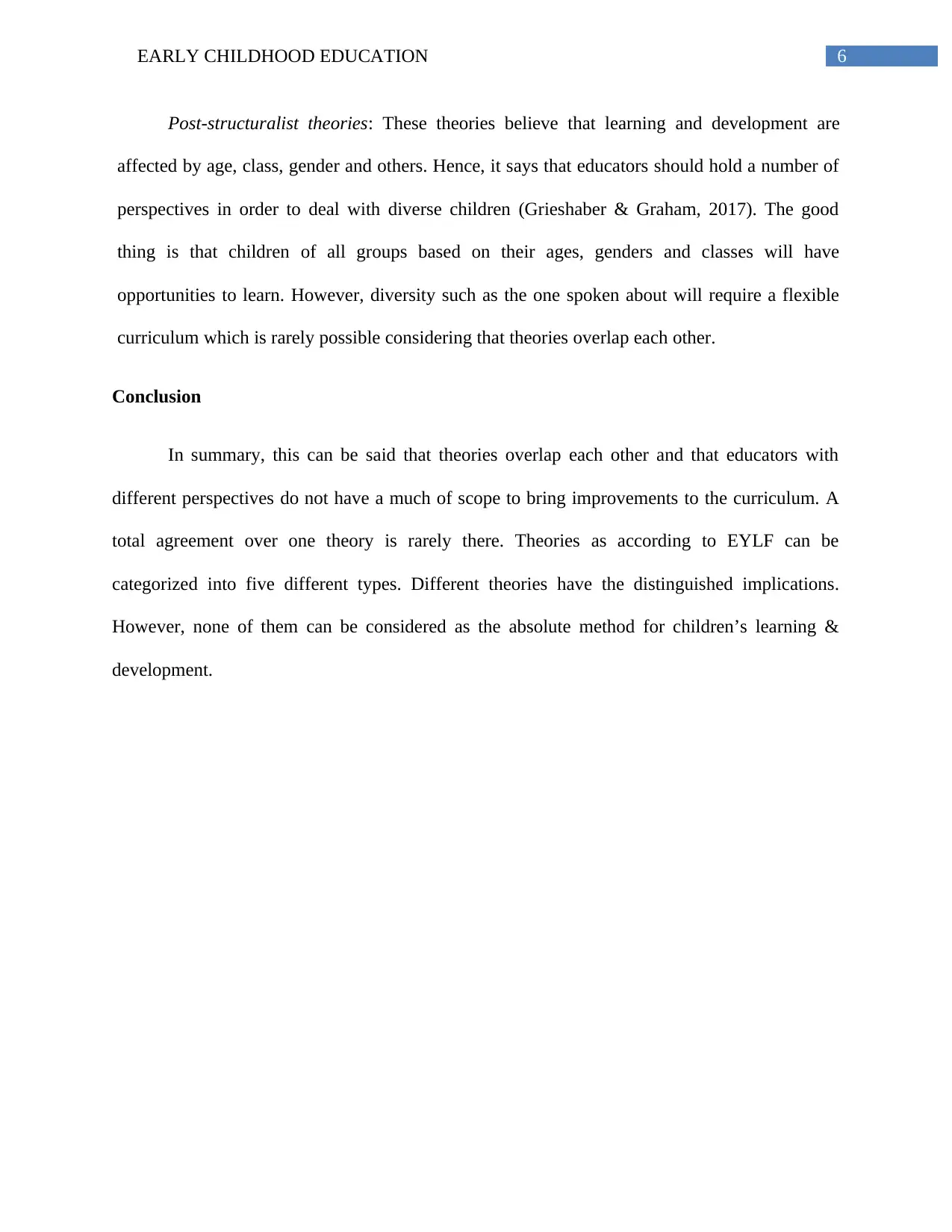
6EARLY CHILDHOOD EDUCATION
Post-structuralist theories: These theories believe that learning and development are
affected by age, class, gender and others. Hence, it says that educators should hold a number of
perspectives in order to deal with diverse children (Grieshaber & Graham, 2017). The good
thing is that children of all groups based on their ages, genders and classes will have
opportunities to learn. However, diversity such as the one spoken about will require a flexible
curriculum which is rarely possible considering that theories overlap each other.
Conclusion
In summary, this can be said that theories overlap each other and that educators with
different perspectives do not have a much of scope to bring improvements to the curriculum. A
total agreement over one theory is rarely there. Theories as according to EYLF can be
categorized into five different types. Different theories have the distinguished implications.
However, none of them can be considered as the absolute method for children’s learning &
development.
Post-structuralist theories: These theories believe that learning and development are
affected by age, class, gender and others. Hence, it says that educators should hold a number of
perspectives in order to deal with diverse children (Grieshaber & Graham, 2017). The good
thing is that children of all groups based on their ages, genders and classes will have
opportunities to learn. However, diversity such as the one spoken about will require a flexible
curriculum which is rarely possible considering that theories overlap each other.
Conclusion
In summary, this can be said that theories overlap each other and that educators with
different perspectives do not have a much of scope to bring improvements to the curriculum. A
total agreement over one theory is rarely there. Theories as according to EYLF can be
categorized into five different types. Different theories have the distinguished implications.
However, none of them can be considered as the absolute method for children’s learning &
development.
Paraphrase This Document
Need a fresh take? Get an instant paraphrase of this document with our AI Paraphraser
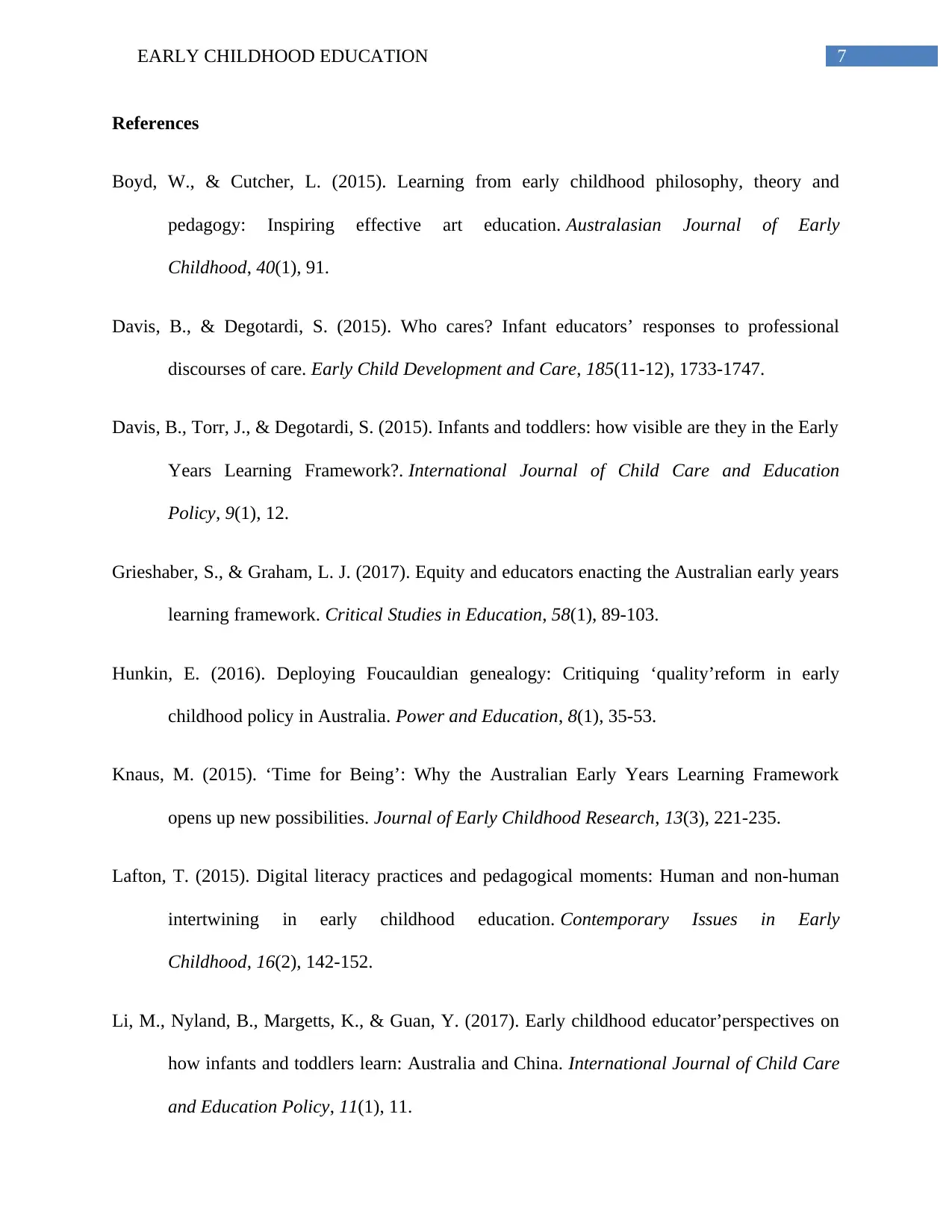
7EARLY CHILDHOOD EDUCATION
References
Boyd, W., & Cutcher, L. (2015). Learning from early childhood philosophy, theory and
pedagogy: Inspiring effective art education. Australasian Journal of Early
Childhood, 40(1), 91.
Davis, B., & Degotardi, S. (2015). Who cares? Infant educators’ responses to professional
discourses of care. Early Child Development and Care, 185(11-12), 1733-1747.
Davis, B., Torr, J., & Degotardi, S. (2015). Infants and toddlers: how visible are they in the Early
Years Learning Framework?. International Journal of Child Care and Education
Policy, 9(1), 12.
Grieshaber, S., & Graham, L. J. (2017). Equity and educators enacting the Australian early years
learning framework. Critical Studies in Education, 58(1), 89-103.
Hunkin, E. (2016). Deploying Foucauldian genealogy: Critiquing ‘quality’reform in early
childhood policy in Australia. Power and Education, 8(1), 35-53.
Knaus, M. (2015). ‘Time for Being’: Why the Australian Early Years Learning Framework
opens up new possibilities. Journal of Early Childhood Research, 13(3), 221-235.
Lafton, T. (2015). Digital literacy practices and pedagogical moments: Human and non-human
intertwining in early childhood education. Contemporary Issues in Early
Childhood, 16(2), 142-152.
Li, M., Nyland, B., Margetts, K., & Guan, Y. (2017). Early childhood educator’perspectives on
how infants and toddlers learn: Australia and China. International Journal of Child Care
and Education Policy, 11(1), 11.
References
Boyd, W., & Cutcher, L. (2015). Learning from early childhood philosophy, theory and
pedagogy: Inspiring effective art education. Australasian Journal of Early
Childhood, 40(1), 91.
Davis, B., & Degotardi, S. (2015). Who cares? Infant educators’ responses to professional
discourses of care. Early Child Development and Care, 185(11-12), 1733-1747.
Davis, B., Torr, J., & Degotardi, S. (2015). Infants and toddlers: how visible are they in the Early
Years Learning Framework?. International Journal of Child Care and Education
Policy, 9(1), 12.
Grieshaber, S., & Graham, L. J. (2017). Equity and educators enacting the Australian early years
learning framework. Critical Studies in Education, 58(1), 89-103.
Hunkin, E. (2016). Deploying Foucauldian genealogy: Critiquing ‘quality’reform in early
childhood policy in Australia. Power and Education, 8(1), 35-53.
Knaus, M. (2015). ‘Time for Being’: Why the Australian Early Years Learning Framework
opens up new possibilities. Journal of Early Childhood Research, 13(3), 221-235.
Lafton, T. (2015). Digital literacy practices and pedagogical moments: Human and non-human
intertwining in early childhood education. Contemporary Issues in Early
Childhood, 16(2), 142-152.
Li, M., Nyland, B., Margetts, K., & Guan, Y. (2017). Early childhood educator’perspectives on
how infants and toddlers learn: Australia and China. International Journal of Child Care
and Education Policy, 11(1), 11.
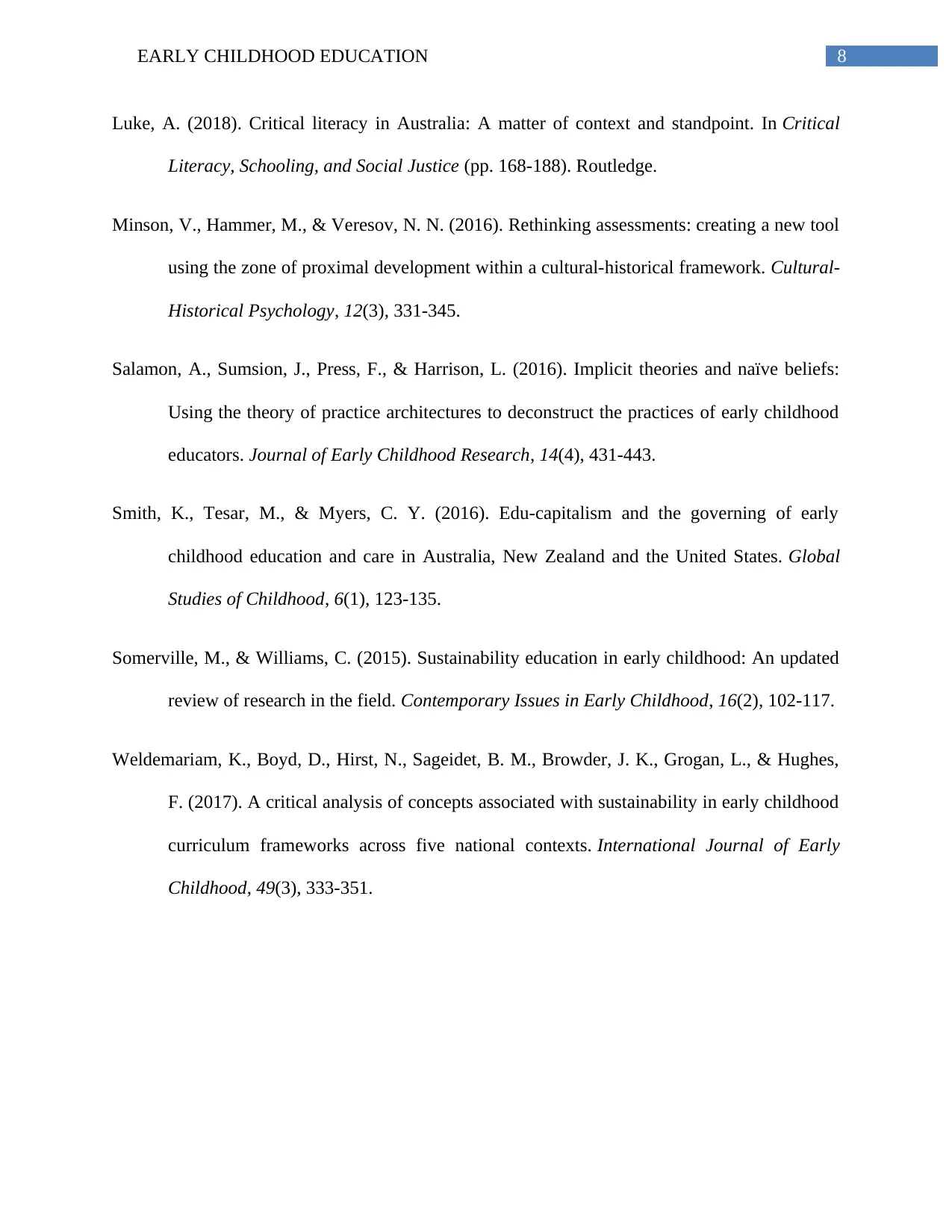
8EARLY CHILDHOOD EDUCATION
Luke, A. (2018). Critical literacy in Australia: A matter of context and standpoint. In Critical
Literacy, Schooling, and Social Justice (pp. 168-188). Routledge.
Minson, V., Hammer, M., & Veresov, N. N. (2016). Rethinking assessments: creating a new tool
using the zone of proximal development within a cultural-historical framework. Cultural-
Historical Psychology, 12(3), 331-345.
Salamon, A., Sumsion, J., Press, F., & Harrison, L. (2016). Implicit theories and naïve beliefs:
Using the theory of practice architectures to deconstruct the practices of early childhood
educators. Journal of Early Childhood Research, 14(4), 431-443.
Smith, K., Tesar, M., & Myers, C. Y. (2016). Edu-capitalism and the governing of early
childhood education and care in Australia, New Zealand and the United States. Global
Studies of Childhood, 6(1), 123-135.
Somerville, M., & Williams, C. (2015). Sustainability education in early childhood: An updated
review of research in the field. Contemporary Issues in Early Childhood, 16(2), 102-117.
Weldemariam, K., Boyd, D., Hirst, N., Sageidet, B. M., Browder, J. K., Grogan, L., & Hughes,
F. (2017). A critical analysis of concepts associated with sustainability in early childhood
curriculum frameworks across five national contexts. International Journal of Early
Childhood, 49(3), 333-351.
Luke, A. (2018). Critical literacy in Australia: A matter of context and standpoint. In Critical
Literacy, Schooling, and Social Justice (pp. 168-188). Routledge.
Minson, V., Hammer, M., & Veresov, N. N. (2016). Rethinking assessments: creating a new tool
using the zone of proximal development within a cultural-historical framework. Cultural-
Historical Psychology, 12(3), 331-345.
Salamon, A., Sumsion, J., Press, F., & Harrison, L. (2016). Implicit theories and naïve beliefs:
Using the theory of practice architectures to deconstruct the practices of early childhood
educators. Journal of Early Childhood Research, 14(4), 431-443.
Smith, K., Tesar, M., & Myers, C. Y. (2016). Edu-capitalism and the governing of early
childhood education and care in Australia, New Zealand and the United States. Global
Studies of Childhood, 6(1), 123-135.
Somerville, M., & Williams, C. (2015). Sustainability education in early childhood: An updated
review of research in the field. Contemporary Issues in Early Childhood, 16(2), 102-117.
Weldemariam, K., Boyd, D., Hirst, N., Sageidet, B. M., Browder, J. K., Grogan, L., & Hughes,
F. (2017). A critical analysis of concepts associated with sustainability in early childhood
curriculum frameworks across five national contexts. International Journal of Early
Childhood, 49(3), 333-351.
⊘ This is a preview!⊘
Do you want full access?
Subscribe today to unlock all pages.

Trusted by 1+ million students worldwide
1 out of 9
Related Documents
Your All-in-One AI-Powered Toolkit for Academic Success.
+13062052269
info@desklib.com
Available 24*7 on WhatsApp / Email
![[object Object]](/_next/static/media/star-bottom.7253800d.svg)
Unlock your academic potential
Copyright © 2020–2026 A2Z Services. All Rights Reserved. Developed and managed by ZUCOL.





